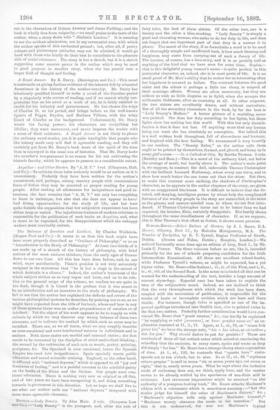The Balance of Emotion and Intellect. By Charles Waldstoin. (Kegan
Paul and Co.)—It seems to us that this book might have been more properly described as "Outlines of Philosophy," or as an "Introduction to the Study of Philosophy." At least two-thirds of it are made up of a sketch of the history of philosophy, with brief notices of the most eminent thinkers, from the early ages of Greece down to our own time. All this has been done before, and, to our mind, more satisfactorily. Plato's position is not very accurately assigned in the statement that " he is but a stage in the ascent of which Aristotle is a climax." Indeed, the author's treatment of the whole subject strikes us as very vague and loose, and as to its rela- tion to the general scope of the volume, we confess we are quite in the dark, though it is hinted in the preface that it was meant to be an introduction and an incentive to the study of philosophy. We fail to see that the author has explained the defects and errors of the various philosophical systems he describes, by pointing out to us, as we might have expected from the title of his book, where and how in any of these systems there was an undue preponderance of emotion or of intellect. Yet the object of his work appears to be to supply us with criteria by which wo may discover any wrong balance of these two elements, and to indicate the method by which such an error may be rectified. There are, as we all know, what we may roughly describe as over-emotional and over-intellectual natures in individuals and in nations. Both these states are morbid and unsound states ; the first needs to be corrected by the discipline of strict methodical thinking ; the second by the cultivation of such arts as music, poetry, painting, sculpture, &o. The Spaniard is over emotional, hence tho Spanish Empire has sunk into insignificance. Spain specially wants public education and sound scientific training. England, on the other hand, is afflicted with "national dryness," which is opposed to all "joy and freshness of feeling," and is a painful contrast to the mirthful gaiety on the banks of the Rhine and the Neckar. Our people want emo- tional education. There is nothing very new or original in all this, and of late years we have been recognising it, and doing something towards improvement in this direction. Let us hope we shall live to see what our author calls our " national dryness" tempered with some more agreeable elements.






























 Previous page
Previous page